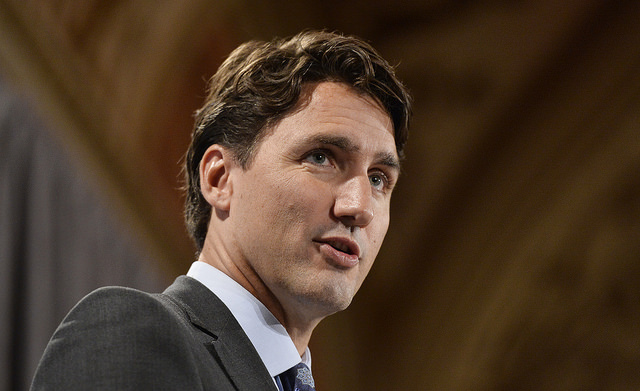Like this article? rabble is reader-supported journalism. Chip in to keep stories like these coming.
There is no doubt that Prime Minister Justin Trudeau is exceedingly popular.
Just this month the Toronto Star reported, “Trudeau’s Liberals continue to command the support of half of Canadians, according to a new poll that projects the party would win 80 per cent of the seats if an election were held today.” The Forum Research poll found that 52 per cent of respondents would vote Liberal, 28 per cent for the Conservatives, and 11 per cent for the NDP. Forum Research projects that would mean 278 seats for the Liberals, 55 seats for the Conservatives, and just 5 seats for the NDP. The Greens and Bloc Québécois would not win any seats.
At least part of this can be attributed the government still being relatively new (just eight months old now), favourable comparisons to the previous Conservative government, and popular gestures (including Trudeau’s recent participation in the Pride parade in Toronto). That’s understandable. But some of that popularity may also be based on the perception that the Trudeau government is a truly progressive government that is implementing a decidedly different agenda than the Harper government. The evidence is beginning to suggest that’s not totally true.
There have been concerns over the past number of months including:
- Defence Minister Harjit Sajjan increasing Canada’s military presence in Iraq (more soldiers, more special forces troops, plus supplying an aircraft to refuel coalition bombers while in the air)
- Natural Resources Minister Jim Carr saying that now is “not the moment” to begin phasing out fossil fuel subsidies and that a liquefied natural gas subsidy should be locked in until 2025
- Environment Minister Catherine McKenna approving the Woodfibre LNG terminal in Squamish, British Columbia
- Health Minister Jane Philpott saying that pharmacare is not part of her mandate
- International Trade Minister Chrystia Freeland supporting the provisional application of the Canada-EU free trade agreement (despite massive opposition in Europe and reports that provisional application could be illegal)
- Fisheries Minister Dominic Leblanc not responding to repeated First Nations demands to deny the Fisheries Act permits needed for construction on the Site C dam to continue
And just last week alone these issues have arisen:
- The Canadian Press reports, “Quebec’s health minister says the federal government has indicated it plans to let the annual increase in provincial health transfers fall to half its current level by the end of the year. …Federal Health Minister Jane Philpott would only say that the transfer provides a stable funding base and that any additional cash would be focused on priority areas like home care and mental health.” Trudeau’s first budget, delivered in March 2016, stated that health transfers would increase by 2.8 per cent in 2017-18, which is below the 3 per cent minimum promised by the Conservatives.
- APTN reports, “Justice Minister Jody Wilson-Raybould made the government’s stance on [the United Nations Declaration on the Rights of Indigenous Peoples, UNDRIP] a little clearer by saying it can’t be adopted as is into Canadian law. Wilson-Raybould stated, “Simplistic approaches such as adopting the United Nations declaration as being Canadian law are unworkable and, respectfully, a political distraction to undertaking the hard work actually required to implement it back home in communities.” The government has also been evasive on whether UNDRIP and its right to free, prior and informed consent would mean a veto over pipeline projects.
- CBC reports, “First Nations chiefs expressed growing frustration with a delay in the federal government’s launch of a national inquiry into missing and murdered Indigenous women, calling on both the provinces and Ottawa to stop dragging their feet… [Assembly of First Nations Regional Chief Shane] Gottfriedson said while the Trudeau government was quick to ‘spring into action’ with the pre-inquiry phase as several ministers consulted with the families of the victims, the launch of the inquiry itself is now dragging on.”
- VICE News reports, “The Canadian government is providing military bases, staff, and resources to test-drive the heavily armored, and highly-controversial military vehicles being purchased by the Saudi government. They also prove that, despite what the government of Canada has said, this is not just a deal between a private company and a foreign country: It is a deal between the Kingdom of Saudi Arabia and Canada itself.” And The Globe and Mail reports, “[A new] poll found that a total of 73 per cent of respondents had some degree of opposition to the sale of Canadian military goods to Saudi Arabia.”
The federal government also faces a number of upcoming crucial decisions in the coming months, including on a nuclear waste dump on Lake Huron (expected soon), the Pacific Northwest LNG terminal on Lelu Island (in late September), its new carbon emission reduction targets (before the next UN climate summit in November), the TransMountain tar sands pipeline (in December), the privatization of public assets such as airports (perhaps by March 2017), its proposal for electoral reform (legislation will come in May 2017), the Trans-Pacific Partnership (by November 2017), and the Energy East pipeline (by March 2018).
The Council of Canadians will continue to acknowledge when the federal government makes good decisions, but will more significantly continue to be a voice for the public interest on climate justice (organizing against tar sands pipelines such as Energy East), fair trade (mobilizing against CETA and the TPP), water protection (calling for the Navigable Waters Protection Act to be restored and enhanced), and public health care (demanding adequate transfer payments, no extended patents for pharmaceutical corporations in “trade” agreements).
Photo: Canada 2020/flickr
Like this article? rabble is reader-supported journalism. Chip in to keep stories like these coming.




